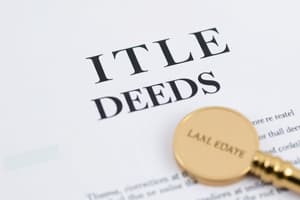Podcast
Questions and Answers
What is a deed?
What is a deed?
- A type of lease.
- A legal written instrument by which an owner conveys an ownership interest in real property. (correct)
- A verbal agreement between parties.
- An informal document.
List one element in a deed.
List one element in a deed.
Written Instrument
What is a 'strawman' in legal terms?
What is a 'strawman' in legal terms?
A substitute or dummy party to a contract.
A deed must explicitly state the intention to transfer an interest in real property, known as ______________.
A deed must explicitly state the intention to transfer an interest in real property, known as ______________.
The Habendum clause indicates the type of title being conveyed.
The Habendum clause indicates the type of title being conveyed.
What must a deed have to be valid?
What must a deed have to be valid?
What is created by a discrepancy in the grantor's name on the deed?
What is created by a discrepancy in the grantor's name on the deed?
What type of clause is 'to have and to hold forever'?
What type of clause is 'to have and to hold forever'?
What is a deed reservation?
What is a deed reservation?
What is a deed exception?
What is a deed exception?
What are mineral rights classified as?
What are mineral rights classified as?
What are restrictions for subdivisions called?
What are restrictions for subdivisions called?
What legal description is required on deeds in Indiana?
What legal description is required on deeds in Indiana?
What is the purpose of an acknowledgment?
What is the purpose of an acknowledgment?
Which type of deed offers the maximum number of warranties and covenants?
Which type of deed offers the maximum number of warranties and covenants?
What happens when a title is conveyed by a different type of deed than the one used previously?
What happens when a title is conveyed by a different type of deed than the one used previously?
Match the following definitions with the corresponding terms:
Match the following definitions with the corresponding terms:
Flashcards are hidden until you start studying
Study Notes
Deeds Overview
- A deed is a legal document that conveys ownership interest in real property from a grantor to a grantee.
Elements of a Deed
- Required elements include:
- Written instrument
- Date of execution
- Named parties (Grantor and Grantee)
- Consideration (or recital thereof)
- Words of conveyance
- Legal description of the property
- Exceptions and restrictions
- Warranties and covenants
- Grantor's signature
- Delivery and acceptance
- Acknowledgment
- Recording
Key Terms
- Strawman: A placeholder in a contract representing an undisclosed true party.
- Words of Conveyance: Indicate the intent to transfer an interest in real property.
- Habendum Clause: Specifies the type of title being conveyed (e.g., fee simple absolute, life estate).
Types of Deeds
- General Warranty Deed: Offers maximum warranties against title defects arising both during and before grantor's ownership.
- Special Warranty Deed: Limits warranties to actions taken by the current grantor only.
- Quitclaim Deed: Provides no warranties; the grantor does not guarantee ownership or rights to the property.
Covenants
- Covenant of Seisin: Guarantees the grantor owns the property and can convey it.
- Covenant Against Encumbrances: Asserts there are no monetary claims against the property unless specified.
- Covenant of Further Assurance: Requires the grantor to rectify issues with the title.
- Covenant of Quiet Enjoyment: Protects the grantee from eviction and disturbances.
- Covenant of Warranty Forever: Ensures the grantee’s title and possession are free of third-party claims.
Legal Concepts
- Cloud on Title: Arises from discrepancies in the grantor’s name on the deed.
- Constructive Notice: Knowledge a person is expected to have because it could be discovered through public records.
- Actual Notice: Direct knowledge of a fact, such as a sale of property.
Exceptions and Reservations
- Deed Reservation: Rights the grantor retains but does not convey (e.g., mineral rights).
- Deed Exception: Rights not held by the grantor and therefore not conveyed (e.g., previously owned mineral rights).
Restrictions
- Restrictive Covenants: Limitations established for subdivisions benefiting all landowners and "run with the land."
Indiana Specifics
- Requires a full legal property description in all deeds, consistent with prior documents.
- All documents meant to convey, transfer, or change title require endorsement from the Auditor's Office before recording.
Important Legal Protections
- Acknowledgment: A process to prevent forgery and fraudulent documents from taking effect.
- Recording: While not mandatory, advisable for public record keeping of deeds.
Quiz Points
- Key quiz points provide scenarios for understanding types of warranties, the significance of clauses, and recognition of deed characteristics.
Final Concepts
- Types of deeds determine the number of warranties and covenants involved.
- Future liability can be affected by the type of deed used in property transactions.
Studying That Suits You
Use AI to generate personalized quizzes and flashcards to suit your learning preferences.





